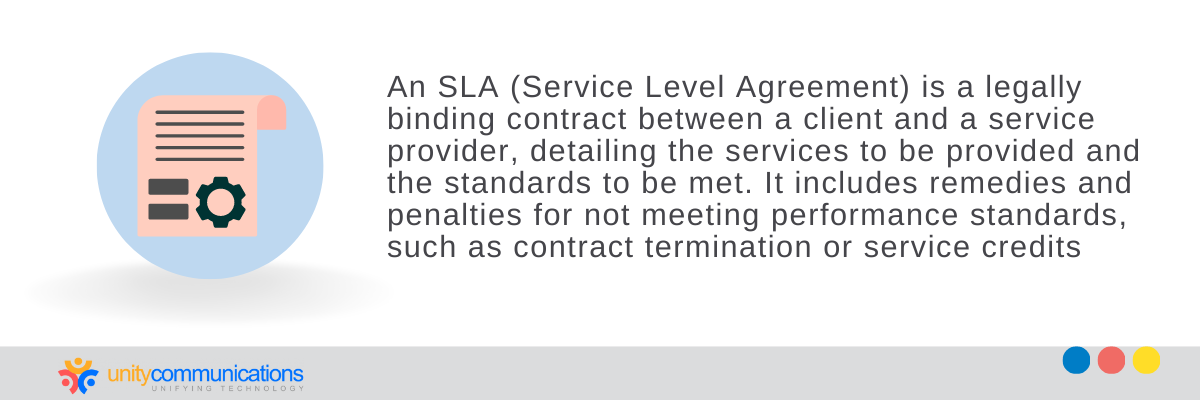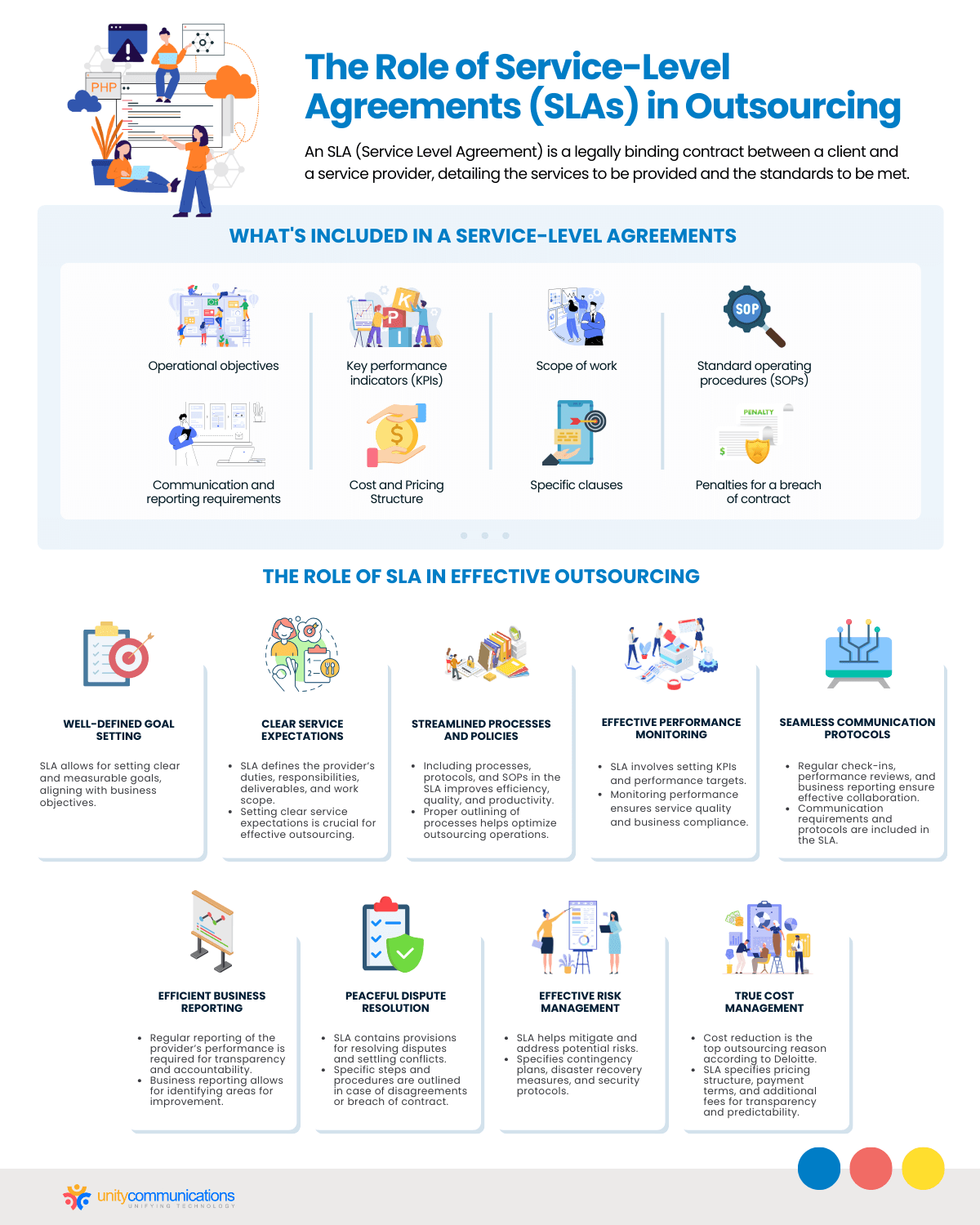Table of Contents
A service-level agreement (SLA) is crucial to effective business process outsourcing (BPO). It defines the relationship between the client and its BPO service provider. This legally binding contract can be instrumental to your overall outsourcing success.
But what exactly is an SLA? How does it impact your outsourcing engagement?
This page delves into the role of SLAs in effective outsourcing. Read on to understand what this contract covers, how it can benefit your business, and what best practices to follow when drafting and implementing it.
What Is an SLA?

An SLA is a legally binding contract between a client and a service provider. It outlines the services the contracted provider must deliver and the standards they must meet. Apart from these, it also provides remedies and penalties for not meeting performance standards.
The SLA also specifies the consequences for failing to hit one of the metrics, such as an outright contract termination or service credits for the client. Conversely, pre-determined perks and bonuses incentivize the service provider to exceed these metrics.
The role of SLAs in effective outsourcing is broad. But in a nutshell, it seeks to define business goals, set proper expectations, establish measurable targets, and ensure accountability. For the uninitiated, this contract covers the following:
- Operational objectives. You aim to achieve these goals through the outsourcing partnership. However, they must be SMART: specific, measurable, achievable, relevant, and time-bound. Over half of the surveyed participants believe that the SMART framework helps them achieve their goals better than when they do not use it.
- Key metrics. These metrics, or key performance indicators (KPIs), usually focus on service efficiency, quality, and customer satisfaction (CSAT) in BPO. Common KPIs in outsourcing include average handling time (AHT), quality assurance (QA) score, and CSAT rate.
- Scope of work. The scope describes the services, including the BPO agents’ duties and responsibilities. It also sets the work parameters by mentioning the limitations and exclusions.
- Processes and policies. The SLA often details the delegated functions’ standard operating procedures (SOPs). They include specific workflows to follow and policies to comply with.
- Communication and reporting requirements. The contract includes the communication protocols for stakeholders and team members and the methods for reporting progress, issues, and other relevant information.
- Pricing model. The contract covers the outsourcing cost and the agreed-upon pricing structure. This section details the pricing tiers, payment terms, billing frequency, and any additional costs or fees.
- Specific clauses. A comprehensive SLA includes all aspects critical to outsourcing operations. On top of these are indemnity clauses, dispute resolution processes, escalation procedures, intellectual property (IP) rights, confidentiality agreements, data privacy policies, and network security requirements.
- Remedies and penalties. These provisions outline the remedies and penalties for a breach of contract. Non-compliance with the SLA terms might result in legal and financial consequences. It can escalate to the termination of the contract.
- Contract review and modification. Finally, the contract defines the procedures for periodically reviewing and modifying the SLA. This mandate is imperative to accommodate changes in business requirements and operations.
The Role of SLA in Effective Outsourcing

It is crucial to understand what BPO is—a business partnership between a client and a service provider. In this strategy, the client hires a third-party vendor to handle some of its processes, such as customer service, sales, or technical support.
Outsourcing involves two companies working together towards common business goals. A client works with its contracted BPO service provider to improve its business operations. An SLA is essential for ensuring an effective outsourcing engagement.
Below are the specific roles of an SLA contract for effective outsourcing:
Well-Defined Goal Setting
Every business exists for a reason, whether to sell products or offer services. They have various goals—increasing productivity, boosting sales, winning new customers, keeping loyal supporters, and more. Unfortunately, 93% of workers cannot tie their actions to organizational goals.
When outsourcing, ensure your BPO partner aligns with your business goals and works towards achieving them. A reliable third-party provider should be able to meet these objectives. An SLA lets you set clear and measurable goals and guides your provider in their strategic service implementation.
Clear Service Expectations
Outsourcing involves delegating tasks to a third-party service provider. Your contracted BPO partner should know exactly how to handle your business functions. As such, setting clear service expectations is the primary role of SLAs in effective outsourcing.
The SLA contract defines your expectations for hiring a BPO service provider. It outlines the provider’s duties and responsibilities, not to mention their specific deliverables and work scope. By establishing these guidelines, your provider can more effectively accomplish their tasks.
Streamlined Processes and Policies
A business usually involves a lot of processes and workflows crucial to day-to-day operations. When outsourcing, clients often define and outline the expected services. However, some do not include specific processes and business policies.
Outlining the processes, protocols, and policies in your SLA is best. You can also include the SOPs defining the roles, tasks, and workflows. Doing so helps streamline and optimize outsourcing operations, improving efficiency, quality, and productivity.
Effective Performance Monitoring
Every business sets goals and key metrics. A vital part of the overall equation is monitoring performance and measuring targets. Doing so is crucial in outsourcing since you entrust your business functions to an external provider.
Performance monitoring is one specific role of SLAs in effective outsourcing. Aside from setting KPIs, you should consider requiring your hired BPO provider to establish a quality assurance (QA) team. This team monitors your BPO team and measures their performance to ensure service quality and business compliance.
Seamless Communication Protocols
Outsourcing is a collaboration between two companies. One seeks another company’s expertise to optimize its operations and improve its products or services. Effective communication between parties is the key to business success.
Having communication requirements and protocols included in your SLA is crucial. This contract should require regular check-ins, performance reviews, and business reporting. These meetings ensure effective collaboration for outsourcing success.
Efficient Business Reporting
Performance monitoring is one thing; reporting is another. Companies should not just track performances; they should also report business results. Business reporting is vital for transparency, decision-making, and service improvements.
Efficient reporting is another role of the SLA that ensures effective outsourcing. This contract should require regular reporting of the BPO service provider’s performance for transparency and accountability. Constant updates allow you to identify areas for improvement and seek ways to address them.
Peaceful Dispute Resolution
Outsourcing brings two companies together. The nature of this strategy involves some business risks. For one, potential disagreements and conflicts might arise between the two parties. That is when an SLA becomes incredibly helpful.
The SLA helps resolve and settle any disputes in the outsourcing partnership. It should contain specific provisions for resolving disputes and settling conflicts. Outline the steps and procedures to be followed in case of disagreements or breach of contract.
Effective Risk Management
Outsourcing is risky since clients entrust parts of their business operations to a third-party service provider. They might encounter challenges such as communication barriers, cultural differences, and potential disruptions. An SLA contract comes into play to help manage risk.
The role of an SLA in effective outsourcing is to help mitigate and address potential risks. It clearly defines the KPIs and SOPs so your hired BPO provider knows exactly what to do. The contract also specifies contingency plans, disaster recovery measures, and security protocols to mitigate risks and ensure business continuity.
True Cost Management
According to Deloitte, cost reduction is the top outsourcing reason. Outsourcing can cut labor expenses by up to 70%. However, you should still properly manage costs. Otherwise, you might encounter some hidden costs during your outsourcing engagement.
An SLA can help you manage outsourcing costs. It specifies the pricing structure, payment terms, and any additional fees. Clearly defining these terms guarantees transparency and predictability in the financial arrangements between you and your contracted service provider.
The Benefits of SLA in BPO

The role of SLAs in effective outsourcing is all-encompassing. It covers the service levels, and the contract includes all the terms and conditions required for BPO operations. Below are the key benefits of an SLA when outsourcing:
- Significant cost savings. An SLA can help you save money by establishing a clear BPO pricing structure. It guarantees transparency in the financial arrangements between you and your BPO provider. It also eliminates the chance of experiencing unnecessary expenses and hidden fees.
- Streamlined business processes. An SLA helps optimize your business processes. It clearly defines the roles, responsibilities, and workflows, eliminating inefficiencies and redundancies. Your BPO provider will have clear instructions for managing operations and expanding your company.
- Increased efficiency and productivity. The SLA can guide and motivate your BPO service provider to enhance their efficiency and productivity with defined metrics and targets. Well-defined SOPs also result in improved service delivery and faster turnaround times.
- Guaranteed quality and compliance. The SLA sets quality standards and compliance requirements. The goal is to ensure your BPO service provider meets or exceeds the expected performance levels. These protocols also ensure it adheres to relevant regulations and industry standards.
- Enhanced customer satisfaction. The role of an SLA in effective outsourcing benefits both the client and the service provider, and it goes as far as increasing customer satisfaction. With an SLA in place, expect excellent service quality from your BPO provider, leading to satisfied and happy customers.
- Reduced outsourcing risk. An SLA addresses potential risks and sets contingencies in place. It ensures the parties involved are prepared to handle unforeseen circumstances, such as security issues, data breaches, and service disruptions. Doing so reduces outsourcing risks and ensures undisrupted operations.
- Ensured accountability. An SLA fosters accountability between you and your BPO service provider. It clearly defines the responsibilities and obligations of both parties. It provides a basis for evaluating and holding your service provider accountable for their performance.
- Sustainable BPO partnership. The role of an SLA can go a long way toward ensuring effective outsourcing and a long-term BPO partnership. This contract promotes mutual understanding, effective communication, and continuous improvement, leading to lasting and successful collaborations.
Best Practices for Effective SLA Management
Earlier, we learned about the benefits and roles of an SLA in effective outsourcing. It is time to share some best practices for effective contract management. The goal is to ensure the SLA covers all the necessary terms and conditions for a successful outsourcing engagement. Follow the steps below:
- Align with business goals. Aligning your SLA with the overarching goals of your business is crucial. Doing so guarantees that the metrics set in the SLA directly contribute to achieving the desired BPO outcomes.
- Set relevant KPIs. Carefully selecting, setting, and aligning your KPIs with your operational objectives is imperative. These metrics should be measurable and relevant, properly guiding the service provider’s performance.
- Measure and monitor performance. Performance monitoring is among the roles of an SLA in effective outsourcing. Regularly measuring and monitoring performance against the set KPIs is vital for the timely identification of any contract deviations and areas of improvement.
- Optimize processes regularly. Consistently improving and optimizing processes is crucial for enhancing business efficiency and effectiveness. Periodically review the SLA to identify opportunities for streamlining operations and eliminating inefficiencies.
- Leverage digital tools for communication. Using digital tools, such as collaboration platforms and project management software, can significantly enhance communication and collaboration between you and your hired BPO provider. These tools facilitate real-time updates, documentation, and seamless information exchange.
- Review and update the SLA. The role of an SLA in effective outsourcing includes contract review and modification. About 62% of businesses sought to renegotiate their BPO contracts. Regularly assess and modify your contract to ensure its relevance to changing business needs, technological advancements, and industry trends.
The Bottom Line

The SLA is a powerful tool for achieving a successful partnership between you and
your hired BPO partner. This legally binding contract defines your objectives, metrics, work, processes, and other clauses vital to outsourcing operations.
Consider the crucial roles of SLAs for effective outsourcing, from setting goals and expectations to managing risks and costs. Develop a comprehensive, fair, and effective outsourcing contract covering all the critical aspects of the BPO partnership.
With a well-drafted SLA, you can establish solid relationships with your BPO partner and achieve outsourcing success!
Looking for a reliable BPO service provider? Unity Communications develops critical SLAs to ensure a successful outsourcing partnership. Let’s connect today to start drafting an SLA for your BPO pursuit!




